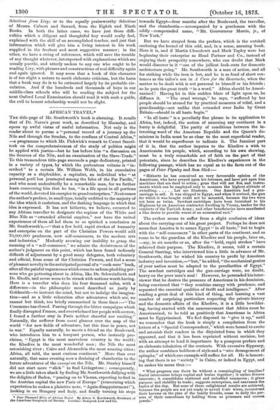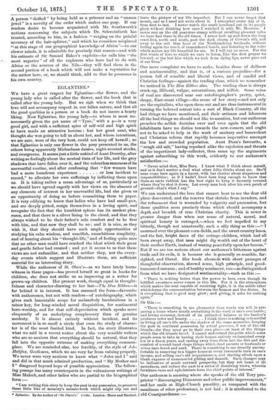AFRICAN TRAVEL.•
THE title-page of Mr. Southworth's book is alarming. It recalls that of Dr. Nares's great work, as described by Macaulay, and opens up awful vistas of useful information. Not only is the reader about to peruse a "personal record of a journey up the Nile and through the Soudan, to the confines of Central Africa," —a programme to which Mr. Pickwick's remark to Count Smorl- tork on the comprehensiveness of the study of politics might be applied with justicebut he has before him "a discussion on the Sources of the Nile, and an examination of the Slave-Trade." To this tremendous title-page succeeds a page dedicatory, printed in a variety of types, by which the portentous volume is " in- scribed" to a certain Mr. William Webb, in his cumulative capacity as a shipbuilder, a capitalist, an individual who " at personal peril has journeyed among the Isles of the Far Pacific," and who must undoubtedly be a remarkable man, for we farther learn concerning him that he has, " in a life spent in all portions of the world, devoted his energies to grand enterprises." Next comes the author's preface, in small type, totally unfitted to the majesty of the idea which it enshrines, and the dashing language in which that idea is expressed. It has not hitherto, we believe, occurred to any African traveller to designate the regions of the White and Blue Nile as "extended alluvial empires," nor have the united experiences of them all led them to so spirited a conclusion as Mr. Southworth's,—" that a few bold, rapid strokes of humanity and enterprise on the part of the Christian Powers would add 70,000,000 producers, now self-consumers, to the modern arts and industries." Modestly avowing our inability to grasp the meaning of a "self-consumer," we admire the decisiveness of the author's judgment on this point, which has been found tediously difficult of adjustment by a good many delegates, both voluntary and official, from some of the Christian Powers, and feel a sense of pleasant novelty in the anticipated perusal of a " cock-sure" book, after all the painful vaguenesses which come to us from plodding per- sons who go pottering about in Africa, like Dr. SchweinfUrth and Dr. Rholfs, and never seem to be struck with notions worth having. Here is a traveller who does his four thousand miles, with a difference—in the philosophic mood described so justly by Goldsmith—to instruct the mind, but not to indulge the imagina- tion—and as a little relaxation after adventures which are; we cannot but think, too briefly summarised in these lines :—" The Commune has closed. Passing through the bitter campaigns which finally disrupted France, and overwhelmed her people with sorrow, I found a further stay in Paris neither cheerful nor exciting." Naturally, the sufferer from ennui glances over the map of the world " for new fields of adventure, but this time in peace, not in war." Equally naturally, he meets a friend on the Boulevard, who introduces him to a buoyant person, who instantly pro- claims, " Egypt is the most marvelous country in the world ; the Khedive is the most wonderful man ; the Nile the most astonishing river ; Cairo and Alexandria the most amazing cities ; Africa, all told, the most curious continent." More than ever naturally, that same evening sees a draining of chambertin to the future adventures of the ennuye on the Nile. Mr. Stanley himself .did not start more " slick " to find Livingstone ; consequently, we are a little taken aback by finding Mr. Southworth dallying with the delights of Baden, "passing on to Vienna, expecting to find in the Austrian capital the new Paris of Enrope " (concerning which expectation he makes a plaintive note, "Again disappointment!"), looking in on Hungary and Italy, and finally turning his steps • Fear Thousand Miles of African Travel. By Alvan S. Southworth, Secretary of She American Geographtal Society. London: Sampson Low and Co.
towards Egypt—four months after the Boulevard, the traveller, and the chambertin —accompanied by a gentleman with the oddly - compounded name, "Mr. Gouverneur Morris, jr., of New York."
But we have strayed from the preface, which is the nutshell enclosing the kernel of this odd, and, in a sense, amusing book. Here it is, and if Martin Chuzzlewit and Mark Tapley were but beginning their enterprise as Head Partner and Co., instead of enjoying their prosperity somewhere, who can doubt that Mark would discover in it "one of the jolliest look-outs for domestic architecture going." Mr. Southworth is a man of action, and all for striking while the iron is hot, and he is as fond of short sen- tences as the tailor's son in A Cure for the Heartache, when the matter to be dealt with is not personal to himself or his friends ; so he puts the great truth " in a word." Africa should be Ameri- canised ! Having let in this sudden blaze of light upon us, he diffuses it. " The cruel wrongs," he says, " suffered by her people should be atoned for by practical measures of relief, and a guardianship—not unlike that extended over India by Great Britain—should in all haste begin."
"In all haste" is a peculiarly fine phrase in its application to Africa, but, indeed, the notion of annexing any continent in a hurry is delightful. The parity of conditions between the in- teresting ward of the American Republic and the Queen's do- minions in India must be so clear to the most superficial reader, that it would be superfluous to indicate it. The funniest part of it is, that the author imputes to the Khedive a wish to Americanise his people, which, according to his own showing, must be a truly remarkable act of faith on the part of that potentate, since he describes the Khedive's experiences in the following passage, which has no equal as to the facts out of the pages of Peter Plymley and Sam Slick:— "Hitherto he has conceived no very favourable opinion of the Americans, who have preyed upon his fortunes, and have put upon him machines that are dead to action ; guns that will not fire, and instru- ments which can be employed only to measure the highest altitude of swindling Let me illustrate. One American had a gun- carriage to sell. It was shipped to Egypt, and when it arrived, the gun for which it was bought could not be mounted, because the two were not born as twins. Sawdust cartridges have been furnished to his Highness by an American contractor dwelling in Vienna, tender for the comforts of the Turkish Army ; and other beneficiaries have manifested a like desire to provide wares of an economical cast."
The author seems to suffer from a slight confusion of ideas about the carrying-out of his great project. Perhaps he does not mean that America is to annex Egypt " in all haste," but to begin with the " self-consumers " in other parts of the continent, and so come to be the guardian of the Khedive and his people, later on, —say, in six months or so, after the " bold, rapid strokes" have achieved their purpose. 'The Khedive, it seems, told a certain General Starring, who interviewed him a little in advance of Mr. Southworth, that he wished his country to profit by American industry and invention,—"but," he added, "the mechanical genius of your nation must be adapted to the peculiarities of Egypt." The sawdust cartridges and the gun-carriage were, no doubt, heavy on the poor man's soul ! However, he persuaded his inter- viewer that be desires the presence of Americans in his dominion, being convinced that " they combine energy with prudence, and separated the essential qualities of thrift and intelligence." After reading a great deal of this kind of thing, and learning a vast number of surprising particulars respecting the private history and the domestic affairs of the Khedive, it is a little bewilder- ing, having started with the announcement that Africa must be Americanised, to be told as positively that Americans in Africa must be Egyptianised. We feel disposed to "give it up," until we remember that the book is simply a compilation from the letters of a " Special Correspondent," which were bound to excite and astonish their readers in the disjointed form in which they appeared, and that it has been reprinted without revision, but with an attemptto lend it importance by a pompous preface and an elaborate tabulation of the contents. With excessive flippancy, the author combines boldness of style and a "nice derangement of epitaphs," of which one example will suffice for all. He is lament- ing that there is no " society " in Cairo, or indeed in Egypt, and he makes his moan thus
What progress can there be without a commingling of families? Social intercourse brings capital and brains together ; it unites diverse interests ; it consolidates scattered and enfeebled commerce ; it gives purpose and stability to trade ; suggests enterprises, and canvasses the topics of the day. But none of these enlightened results are achieved, because the people are not yet ready to unveil their wives, reconstruct their harems on the plan of the family fireside, cease to deify the per- sons of their concubines by holding them as prisoners and unseen jewels." A person " deified " by being held as a prisoner and an "unseen jewel " is a novelty of the order which makes one gasp. If our readers desire to become acquainted with Mr. Southworth's notions concerning the subjects which Dr. Schweinfiirth has treated, according to him, in a fashion "verging on the painful accuracy of the hair-splitter," and which he considers misplaced "at this stage of our geographical knowledge of Africa"—to our slower minds, it is admirable for precisely that reason—and with his estimate of Sir Samuel Baker's exploits—he calls him " the most superior" of all the explorers who have had to do with Africa or the sources of the Nile—they will find them in the second portion of a book which will not make a reputation for the author here, or, we should think, add to that he possesses in his own country.



































 Previous page
Previous page